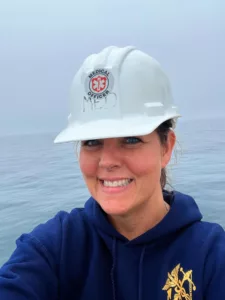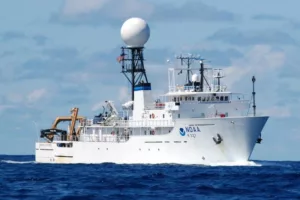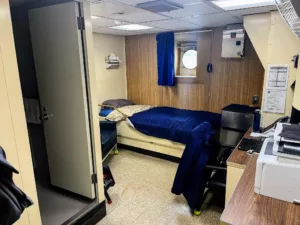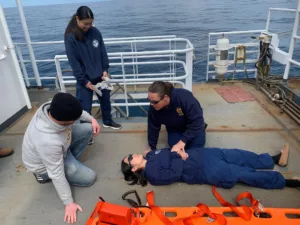Lieutenant and PA Casie Parker Spends One Month at Sea as the Medical Officer for the NOAA Ship Okeanos Explorer
‘This Was a Bucket List Experience for Me.’
July 10, 2023
By Jennifer Walker

In April 2023, Casie Parker, DMSc, PA-C, traveled from Florida to Oregon to serve as medical officer on the National Oceanic and Atmospheric Administration (NOAA) Ship Okeanos Explorer, which is dedicated to exploring and advancing knowledge about our largely unknown oceans. For this tour, the vessel’s team—including NOAA officers, crew members, engineers, and scientists—conducted nine dives using the Deep Discoverer, an unmanned, remotely operated vehicle (ROV), with the goals of mapping the ocean floor and collecting samples four miles below the water’s surface. Parker attended to the medical care of the 48-person team as the ship sailed 100 miles off the coasts of California, Oregon, and Washington.
“We spent a month out to sea and some of it was a little challenging because we had 18-foot waves for a couple days,” says Parker, adding that the gigantic waters were enough to make even the most seasoned deckhands feel seasick. “But it was a fantastic experience. They were sampling coral, rocks, fish, sea stars, jellyfish—just these amazing things that we don’t ever get to see because humans can’t typically get down to that depth.”
This distinctive opportunity was available to Parker because of her full-time role as a lieutenant in the Commissioned Corps of the U.S. Public Health Service (USPHS), part of the nation’s uniformed services that cares for patients in underserved communities in the U.S. and around the world. Parker is one of 6,000 officers with USPHS—a group that includes PAs, physicians, nurses, dentists, veterinarians, engineers, scientists, and more—who are placed with nearly 40 government agencies.

Since 2021, Parker has been placed with the U.S. Department of Veterans Affairs (VA), where she is the lead surgical PA and the thoracic and bariatric surgery coordinator for the Orlando VA Medical Center in Orlando, Florida.
As an officer, Parker also receives notice when there are opportunities to fill a need for a medical provider on tours, or short-term assignments, with USPHS’ partner agencies. On the NOAA Ship Okeanos Explorer, the previous medical officer was assigned to a more pressing tour, and USPHS issued an all-call to its PAs to fill the role. Parker responded.
“NOAA couldn’t do this tour without a provider because the ship was going so far off the coast,” she says. “I fulfilled the mission of USPHS and ensured the tour could go on by providing services. And while not attending to the needs of the crew, I was able to watch the unbelievably gorgeous dives from mission control, assist the scientists with specimens, and soak in the magnificence of the Pacific Ocean from the deck. This was a bucket list experience for me, and it worked out perfectly.”
Serving the Underserved
Parker began her career in law enforcement because she wanted to help people. But after seven years, she says, “It didn’t feel like I was doing that anymore.” So, she left the field and went back to college, where she pursued a degree in developmental psychology while also working as a social worker in welfare for the State of Florida.
During this time, Parker also completed her prerequisites for a PA program—a career path she chose in part because of its versatility. “I wasn’t sure what area of medicine I wanted to dive into, and as a PA, you can transfer into any specialty,” she says. “You can truly do anything with this type of education.”
Parker has done just that since 2014, when she graduated from the PA program at South University in Tampa, Florida. She worked in community mental health and neurosurgery and delved into education as a faculty member with the PA program at Barry University in Miami Shores, Florida.

Since 2012, Parker has also volunteered for several medical missions. Her longest mission was in 2019, when she spent that September in India as part of a medical team providing urgent care services, including treatment for intestinal parasites and burns, laceration repair, and medication administration, often to patients who had never seen a provider before.
Asked why she is drawn to this type of work, Parker says, “We’re really super blessed in the United States. Most of the world doesn’t even have one percent of what we have. I feel like if God has given me gifts, it would be selfish of me not to share them.”
Shortly after returning from India, Parker was talking with her brother, Captain Chris Sloan, an officer with NOAA whose flight doctor is a PA with USPHS. He thought a role with USPHS might be a good fit for Parker, too, because she could do medical missions as part of her job while also continuing to care for the underserved.
The idea was appealing to Parker. “My whole family is military and this would give me an opportunity to give back as they have,” she says. She submitted her application in 2020 and was accepted a year later.
Now, Parker finds tremendous value in providing care to patient populations through USPHS that she might not see in private practice. “You are able to serve folks who truly have nothing,” says Parker, who also holds a Doctor of Medical Science from the University of Lynchburg in Lynchburg, Virginia. “Some might find these roles undesirable, but I find they are the most rewarding.”
Making an Impact at the VA
The mission of the USPHS Commissioned Corps is to protect, promote, and advance the health and safety of the nation. To do this, officers are placed in government agencies such as the Division of Immigration Health Services, the Federal Bureau of Prisons, the Federal Emergency Management Agency, the Indian Health Service, and the NOAA. Parker’s role falls under the Veterans Health Administration (VHA), a branch of the VA and the largest integrated healthcare system in the U.S. The VHA provides care to more than nine million veterans enrolled in its programs.
At the Orlando VA, Parker’s lead surgical PA position encompasses three roles on a daily basis. In thoracic surgery, she says, “We’re in a unique situation in that we don’t have a surgeon yet, so I was brought here to set up the infrastructure in anticipation of starting the program.” Parker evaluates patients who have been diagnosed with lung cancer to see if they are surgical candidates. If they are, she then connects them with healthcare facilities that can perform their surgery, either with a local, non-VA surgery center or another VA facility in St. Petersburg, about 2.5 hours away, and provides follow up care for them afterward.

Parker also evaluates patients who have been diagnosed with obesity to determine if they are candidates for bariatric surgery. The Orlando VA has a fully-functioning bariatric surgery program, so Parker first assists on these cases. She also follows patients closely post-surgery and coordinates their care with several other specialties if needed, including mental health, nutrition, and physical therapy.
Then, as the lead surgical PA, Parker helps the other five surgical PAs address any challenges they may be facing, and she ensures coverage in the clinic and operating room. She will also be onboarding two new surgical PAs in the next couple of months.
Parker was able to see some of her patients remotely while on the NOAA Ship Okeanos Explorer, and she assigned those who needed in-person appointments to other surgical PAs. It helps that her Chief of Surgery at the VA is supportive of USPHS and of Parker going on tours when she is needed—an example of the stellar interagency collaboration that exists between USPHS and its partners, Parker says.
“I’m really fortunate to be able to step into whatever role needs to be filled, regardless of the agency,” she adds.
USPHS Tours and Filling Vital Needs
In early 2022, Parker went on her first tour with USPHS for six weeks. She was placed in Nespelem, Washington, with the Indian Health Service, which serves 29 federally-recognized Indian tribes, including American Indian and Alaska Native people, Tribal leaders, and Tribal organizations. Here, Parker worked at a clinic in an urgent care setting, where there were many sick patients often battling COVID-like symptoms.
Her second tour on the NOAA Ship Okeanos Explorer was different in that the team stayed relatively healthy for the duration of the journey. People were seasick due to the high waves, so she passed out medicine and Powerade on an almost-daily basis. She was woken up in the middle of the night to clean and dress a wound when a deckhand lost the skin on the back of his finger after it was slammed in a door. And she held regular roundtables to address the mental health struggles that can come with being out to sea and away from families for long periods of time.

Parker also had downtime, which she used to create and lead trainings on a variety of topics. After watching the engineers deploy and retrieve the ROV every day, she put together a PowerPoint about how to respond to impalement and crush injuries in case the ROV ever went off course and hit into a team member. She also led trainings about trauma events, burns, C spine injuries, Stop the Bleed, and nutrition.
Because of her great experiences, Parker is enthusiastic about other PAs joining USPHS. Along with the amazing training and deployment opportunities, the practical benefits are great, too: As an officer with the VA, she can access all military benefits, including the GI Bill, which offers funding for college—an especially important benefit for Parker, who has a six-year-old daughter. She also enjoys the camaraderie of being part of an elite and small nationwide medical team.
But perhaps the biggest reason to get involved with USPHS is the opportunity to make a lasting impact on underserved communities. “As medical providers, I think the majority of us want to help people,” says Parker, who is happy to go wherever she is needed for her next tour. “This is an amazing opportunity to do that on a big scale.”
Jennifer Walker is a freelance writer in Baltimore, MD. Contact Jennifer at [email protected].
You Might Also Like
Patient-Provider Trust is Key for Street Medicine PA Sam Halajian
From Practicing in War Zones to Remote Islands, Melinda Rawcliffe Finds Endless Opportunities as a PA
Sixtus Atabong, PA-C, Leads Others to Help Undeserved Communities Around the World
Major Marc Latta Focuses on Transformation
Thank you for reading AAPA’s News Central
You have 2 articles left this month. Create a free account to read more stories, or become a member for more access to exclusive benefits! Already have an account? Log in.



